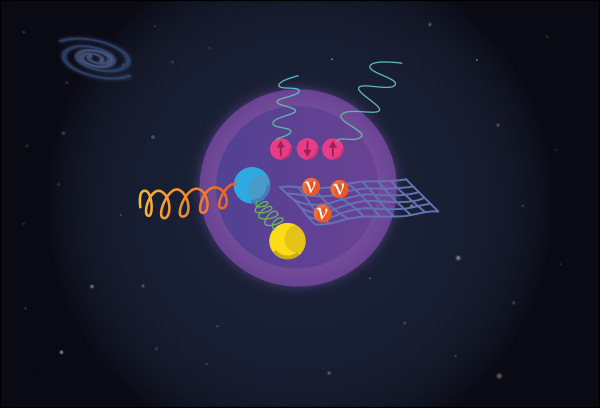Open Quantum Systems: Dissipative Dynamics from Quarks to the Cosmos

Event ID: INT-25-3b
Note: This is an in-person program.
OVERVIEW
The formalism of open quantum systems (OQS) describes the behavior of a quantum system that is in contact with an environment. Such systems are ubiquitous in nature, and the methods used to treat them can be used to describe the real-time evolution of strongly coupled systems. This especially includes the dissipation occurring due to interactions with the environment, which necessitates a non-perturbative real-time description. In combination with effective field theories (EFTs) it is possible to derive quantum master equations from quantum field theories. This enables us to tackle challenging problems in modeling the non-equilibrium evolution of systems in nuclear- and high-energy physics and draw connections to quantum information and condensed matter physics.
This program aims to bring together experts from different fields working on the application of OQS methods in nuclear- and high-energy physics with the goal of exchanging methods and insights gained in the respective sub-fields in order to progress the individual formulations. Furthermore we aim to converge towards a generalized toolbox of Open Quantum System methods and explore the application to new phenomena involving non-equilibrium processes of quantum fields.
TOPICS AND FORMAT
While the program is concerned with open quantum system methods and their application to nuclear- and high-energy physics in general, we center it around three main areas, where open quantum system methods have recently gained traction:
Heavy Quarkonium in the QGP
The evolution of hard probes in the Quark Gluon Plasma in heavy ion collisions can be treated as an Open Quantum System. In recent years, several approaches have been developed that exploit the separation of scales present in the problem to utilize non-relativistic EFTs (NREFTs). EFTs have been shown to be a powerful tool capable of connecting the non-perturbative calculations of lattice QCD with a real-time formulation based on Open Quantum Systems.
Neutrino oscillation
Neutrino oscillations can be influenced by their environment, which can be described as an open quantum system. This allows to probe phenomena like gravitational decoherence and opens up possible applications of the formalism to phenomena like fast Fast Neutrino Flavor Conversions.
Cosmology
The Universe itself is an out of equilibrium quantum system and increasing work is focusing on treating quantum fields in gravity as open quantum systems. As such, this provides a powerful framework to describe processes like inflation, where decoherence and non-equilibrium dynamics play a central role.
Quantum Information
Quantum information science (QIS) provides powerful tools for the study of phenomena under the open quantum systems paradigm, making them a fruitful addition to the proposed program. Quantum simulation enables the to possibility to explore the dynamics of open quantum systems on both digital and analog platforms.
The program is planned to consist of 3-4 talks per day and a discussion session, leaving plenty of time for informal dialogue and collaboration amongst the participants. Talks of the different main topical areas will be grouped together.
